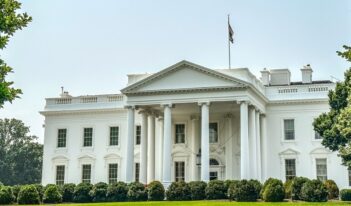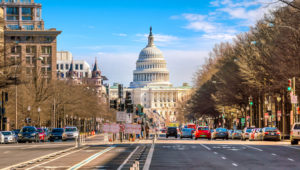
Empowering Congress to fulfill its constitutional role can ensure regulation without administrative bureaucracy.
The emergence of the American administrative state is not a new or recent development, yet it currently faces a crisis of legitimacy. This crisis of legitimacy is itself not a recent development, either. James Freedman, a former professor of law at the University of Pennsylvania, identified this crisis in 1980 in his important book, Crisis and Legitimacy: The Administrative Process and American Government. Just two years ago, Columbia Law School Professor Gillian Metzger noted the reemergence of this legitimacy crisis, dubbing the phenomenon the “1930s Redux” and tracing the resistance to bureaucracy back to the New Deal.
Most of the scholars who point out this legitimacy crisis, however, do so with alarm, because they view the modern state and the administrative state as fundamentally intertwined. Any modern regulatory state, in this view, must be an administrative state, so to attack the legitimacy of the administrative state is to strike at the goals and purposes of modern government. “Anti-Administrativism,” as Professor Metzger calls it, is therefore a vehicle for “antiregulatory and antigovernment forces that lost the battle of the New Deal.”
Professor Metzger rightly identifies a growing skepticism of the administrative state both in American politics generally and in judicial opinions specifically. However, I have offered a different assessment of the origins and effect of anti-administrativism. The core of my view is this: It is possible to have regulation without embracing the administrative state. In fact, that is how America was governed for over a century after the framing of the Constitution.
Anti-administrativism can be traced back much further than the 1930s. It was present at the American Revolution, a fact which accounts for several aspects of American constitutionalism that limit administrative power, such as legislative representation, independent courts, and the separation of powers. Yet as scholars have long noted, states regulated their economies extensively from the very beginning of American history. They just used different institutional actors to do so—courts as well as legislators.
When attempts were made to create new regulatory agencies and vest them with powers formerly entrusted to courts and legislators, especially in the 1880s with the creation of the Interstate Commerce Commission (ICC), anti-administrativism served to preserve the traditional regulatory institutions. This fact explains why administrative power was so weak in America prior to 1900. The creation of the ICC did not mark the birth of the administrative state because the ICC was not vested (at that time) with the powers typical of a modern regulatory agency today. It could not set rates through rulemaking, for example, and it was not authorized to render final decisions that were binding on parties.
The prevalence of anti-administrativism during the 19th Century did not make America a laissez-faire country. As Alexis de Tocqueville observed, in antebellum America “authority is great and the official small, so that society would continue to be well regulated and remain free.” Decades later, the progressive political scientist Frank Goodnow offered a similar assessment, but with disapproval. He wrote that the American approach to administration—one that emphasized “a government of laws, and not of men”—held “unquestioned advantages, particularly in retarding the development of despotism and in preventing arbitrary administrative action; but it makes the development of the administrative function free from the influences of politics almost impossible, since it tends to promote interference by the legislature.”
For Goodnow and other progressives, the traditional American approach to administration inhibited the emergence of an expert bureaucracy, and therefore had to be discarded. Progressives were successful in reducing the power of the legislature and increasing the power of the bureaucracy, and without the influence of anti-administrativism (whose legacy, in part, is the 1946 Administrative Procedure Act), we might have an even more powerful bureaucracy than the one we have today.
Identifying the administrative state’s legitimacy gap, in short, does not entail a desire to get rid of regulation altogether. Reducing that legitimacy gap, moreover, would not require the abolition of regulatory agencies or the elimination of all regulatory programs. It would, however, entail restructuring the institutions of modern government. Most fundamentally, it would require a legislature capable of addressing the challenges of the 21st Century by amassing expertise, engaging in deliberation, and responding efficiently to the sense of the national majority. Our Congress is lacking in all three features, but it can be reformed to return to its former status as the central policymaking institution of our system.
The modern Congress does not amass expertise because it has deprived its committee structure of the incentives to engage in thoughtful deliberation to address national problems. Thanks in large part to well-meaning transparency reforms, committee hearings today are not focused on fact-finding but on playing to electoral constituencies. Term limits on committee chairs, and other reforms, have served to weaken committee expertise, leaving the administrative state further removed from the people it is supposed to serve. Strengthening committee expertise can give Congress the confidence and the capacity needed to avoid ceding power to the bureaucracy.
The modern Congress also does not engage in deliberation. Floor debate in Congress serves no useful purpose, except for making campaign speeches. This is why so few members are usually in attendance when the speeches are made. The capacity and the incentives for members to listen to each other have been diminished, thanks to a variety of factors, including (once again) well-meaning transparency reforms that keep members focused on their constituencies rather than each others’ arguments. Giving members the space and the encouragement to discuss matters with each other, rather than constantly communicating to constituents, can restore Congress’s capacity for deliberation.
Finally, the modern Congress does not respond efficiently to national problems. It is a cumbersome, clunky institution without the necessary rules and procedures to operate effectively or to enable its leadership to assemble coalitions needed to legislate. In its golden age, Congress had leaders who had sufficient authority and allegiance to do the work of bargaining and compromise. Today, congressional leaders can barely manage the conflict within their own ranks. Returning power to party leaders will enable Congress to forge and maintain the coalitions necessary to legislate specifically on national issues once again.
Anti-administrativism has played a significant, and in my view a salutary role, in limiting the potentially arbitrary power of government officials. The administrative state’s emergence was predicated upon reducing the power of traditional regulatory institutions such as courts and legislatures, in favor of a new model: the expert, independent regulatory agency. This is not the only way to structure a modern regulatory state, however. We can have regulation without the administrative state. But to accomplish that goal, we need to fix Congress by restoring its capacity to carry out its constitutional role.




